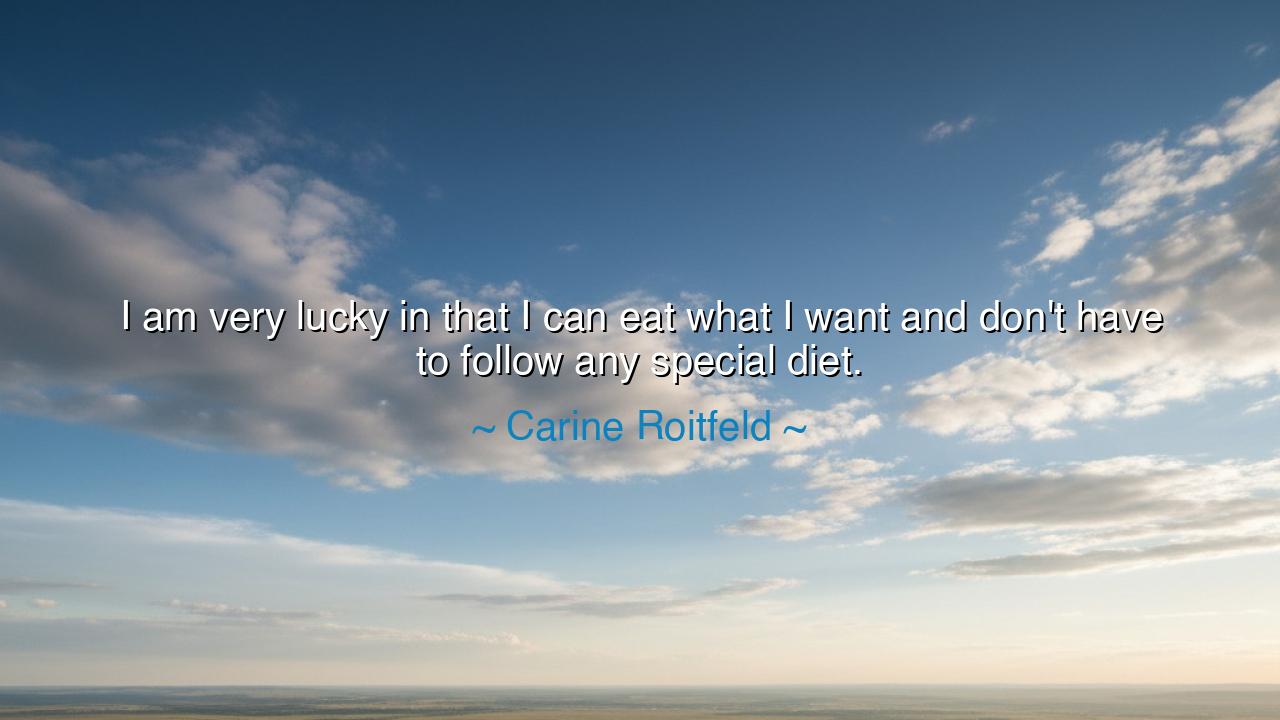
I am very lucky in that I can eat what I want and don't have to
I am very lucky in that I can eat what I want and don't have to follow any special diet.






"I am very lucky in that I can eat what I want and don't have to follow any special diet." These words, spoken by Carine Roitfeld, reveal a profound truth about freedom, moderation, and the deep connection between our bodies and the natural world. Roitfeld’s reflection is not just about the freedom to eat without restraint, but about the balance of life itself—a life in which we do not restrict ourselves, but instead trust in our ability to listen to our bodies and enjoy life with awareness and grace. Her statement invites us to consider how, when we live in alignment with our inner needs, we may not require strict control or rigid rules to find true well-being.
In the ancient world, wisdom was rooted in the understanding that health and vitality arise not from extremes, but from a harmonious balance between moderation and indulgence. Socrates, the great Greek philosopher, once said, "Know thyself." This simple yet powerful dictum speaks to the heart of what Roitfeld embodies in her words. To live well, to be free from the tyranny of restrictive diets or unattainable standards, is to cultivate a deep awareness of what our bodies truly need and to honor those needs with balance. Just as the ancient philosophers sought wisdom through self-knowledge, so too must we understand the subtle, personal nature of our own well-being.
Consider the life of the Romans, who were famed for their feasts and indulgences, yet also recognized the importance of moderation. The great philosopher Cicero often wrote about the value of balance in both body and mind. To the Romans, true strength was found not in deprivation, but in the freedom to enjoy life’s pleasures while maintaining control over one’s desires. Cicero understood that indulgence, when practiced with awareness, could coexist with a life of discipline. Roitfeld’s words echo this ancient ideal: freedom from rigid rules, but a life lived in balance and self-awareness, where one can trust in the body’s natural ability to flourish.
In the same vein, the ancient Spartans—renowned for their strength and discipline—understood that their physical prowess did not arise from severe restriction, but from a balanced approach to diet and exercise. Their meals were simple but nourishing, and their physical routines were intense, focused on strength and endurance rather than indulgence. Yet even they knew that true health was about more than just control—it was about living in harmony with the body’s needs. The Spartan warrior did not need to adhere to elaborate, extreme measures to maintain vitality. This wisdom, mirrored in Roitfeld’s freedom from rigid dieting, teaches us that well-being is cultivated through awareness, not excess or deprivation.
To further understand the deeper meaning of Roitfeld’s words, we must turn to the wisdom of Hippocrates, the ancient healer who is often regarded as the father of modern medicine. He taught that the body should be treated as a temple, one that requires careful nourishment and thoughtful attention. His belief in moderation echoed through his teachings about diet: neither too much nor too little, but a careful balance of foods that served the body’s needs. This timeless wisdom speaks to Roitfeld’s experience—by listening to her body, she instinctively knows when to indulge and when to refrain, without the need for rigid rules or a restrictive diet. She trusts her body, much as Hippocrates would have advised.
The lesson here is one of trust and balance. In modern times, the pressure to conform to strict dietary trends and the obsession with perfection often lead to discontent and struggle. Roitfeld’s approach challenges this, showing us that true health comes not from the extremes of dieting or indulgence, but from the ability to listen to and trust our own bodies. She teaches us that, like the ancients, we do not need to be beholden to a strict set of rules to live well; instead, we can thrive by following our natural instincts and embracing a moderate, thoughtful approach to our nourishment.
In practical terms, Roitfeld’s perspective encourages us to move away from restrictive, fad diets and instead focus on nourishing our bodies in a way that feels natural and aligned with our individual needs. Rather than succumbing to societal pressures or rigid standards, we must focus on mindful eating, listening to our hunger, and choosing foods that nourish and energize us. This means not depriving ourselves, but also not overindulging. Like the philosophers of old, we must find our own balance, trusting our inner wisdom to guide us.
So, let us take Carine Roitfeld’s words to heart. Let us embrace freedom in our approach to food, not bound by the chains of extreme diets or the societal pressures of perfection, but guided by the ancient wisdom of balance and self-awareness. Let us live with the knowledge that true health comes not from perfection, but from honoring our bodies with thoughtful, intuitive choices. In this, we will find the peace, vitality, and freedom to truly flourish in all areas of life.






AAdministratorAdministrator
Welcome, honored guests. Please leave a comment, we will respond soon